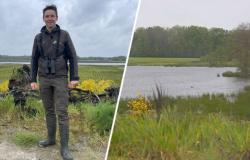According to the Ecological Authority, Gelderland has many good plans for nature restoration of the Veluwe. But partly because of this local approach, area-wide problems such as dehydration and acidification are not being sufficiently addressed, she believes.
According to the Ecological Authority, a broad view of the problems in and around the Veluwe is vital to maintain the largest nature reserve in the heart of the Netherlands. “The largest contiguous nitrogen-sensitive nature reserve in the Netherlands suffers heavily from nitrogen, dehydration and acidification,” the Authority said. She responds in a report to the nature objective analysis (NDA) that the province of Gelderland has drawn up for the area.
Goals not achieved
According to the Ecological Authority, the Veluwe nature objective analysis describes bottlenecks. According to her, these are the excessively high nitrogen deposition, soil acidification, problems with ‘foreign substances’ such as pesticides, desiccation, grazing pressure from game, disturbance and fragmentation. ‘The province and the managers have already taken or planned many effective and necessary recovery measures within the Veluwe. The province rightly concludes that the targets for many nitrogen-sensitive vegetation and species are nevertheless not being achieved. Deterioration often cannot be ruled out.’
Reduction of nitrogen load
The Ecological Authority assesses some conclusions more negatively. ‘For example, for beech-oak forests with holly, which are strongly acidified and for which no effective measures are yet available.’ The Ecological Authority endorses the conclusion in the nature objective analysis that reducing the nitrogen load for the Veluwe is a strict condition for nature recovery.
Amount of water
The Ecological Authority further notes that important problems and measures only really come into focus when the Veluwe is looked at as a whole. ‘Consider the amount of available water, wildlife management, whether there is room for all purposes, and possibilities to connect nature within the Veluwe and with surrounding nature reserves.’
Dehydration increases acidification
Chairman Hans Mommaas: ‘Acidification is reinforced by desiccation. There is a structural water shortage on the Veluwe. This drought therefore increases acidification, which is already worryingly high. The Veluwe is a large-scale and sandy area and collects a lot of water. This water then flows to all flanks, via streams and groundwater even to Flevoland. Insight into how this water engine of the Veluwe as a whole works and how you conserve and distribute the water in the area is essential. This is not clearly reflected in the NDA. Better measures can be taken by looking at the Veluwe as a whole.’
Transitional areas
The Ecological Authority recommends including such an approach at the highest scale level in all future plans and also looking at measures in transition areas that can form a buffer for the Veluwe nature.
Tags: Advice Ecological Authority Gelderland integral approach acidified Veluwe VeeenGewas .nl






